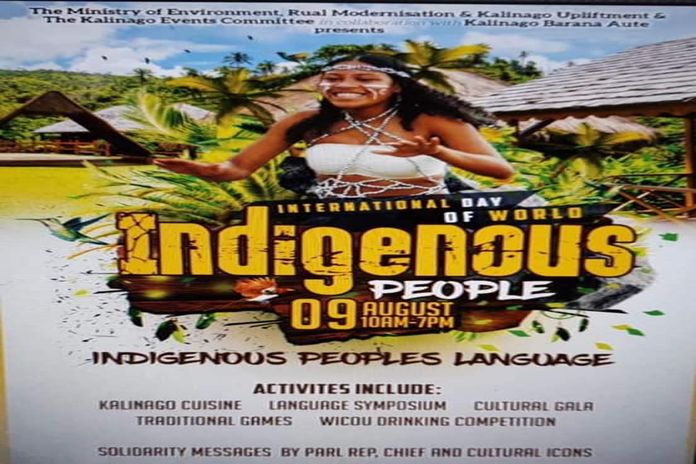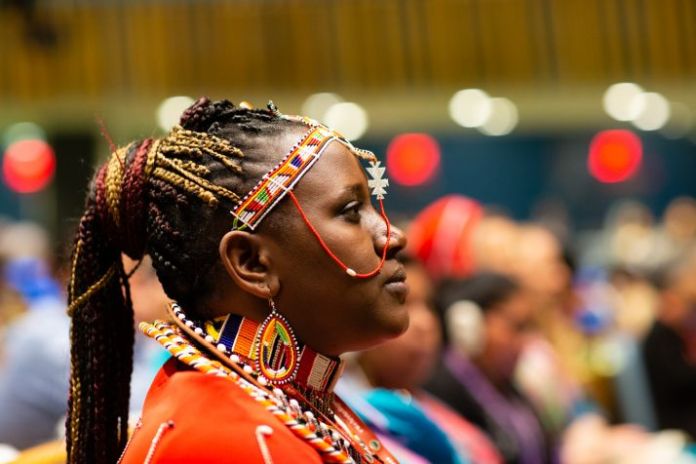By Caribbean News Global ![]()
TORONTO, Canada – International Day of the World’s Indigenous Peoples, a time to recognize the contributions of those who’ve called this land home since time immemorial. No relationship is more important to the government of Canada than that with Indigenous peoples, a Nation-to-Nation partnership. This commitment includes major investments in housing, education, and health care, implementing co-developed legislation on Indigenous languages and child and family services, and introducing federal legislation on the United Nations Declaration on the Rights of Indigenous Peoples.
In Dominica, according to Cozier Frederick, minister of environment, rural modernisation & Kalinago upliftment, “in my presentation at the recent budget debate, I extended an invitation to all citizens to participate in activities on International Day of the World’s Indigenous Peoples 2020. That day reminds the world of the first meeting of the UN Working Group on indigenous populations of the sub-commission on the promotion and protection of human rights in 1982 and was first pronounced by the United Nations General Assembly in December 1994.”

In Dominica, activities hosted by the Kalinago BaranaAute is supported by the government of Dominica, under the theme: “COVID-19 and Indigenous Peoples’ Resilience”.
In the summary of the public sector investment programme for 2020/21 – The road to Dynamic Dominica: Fostering economic resilience, states: “Environment, Rural Modernization and Kalinago Upliftment $61,812,002 – 14.47 percent.”
Prime minister Roosevelt Skerrit delivering his budget address for the 2020/2021 fiscal year said:
“I am pleased to announce to this honourable House and the people of Dominica, particularly the people of the east, that a contract in the amount of $126.8 million has been awarded for the full rehabilitation of approximately 30 kilometers of road from Bois Diable in the Emerald Pool area, to Castle Bruce, and through the Kalinago Territory to Hatton Garden. This project is expected to commence in August 2020 and will include the construction of new bridges, drainage systems, road widening and straightening, and new road surfaces. I wish to point out to this honourable House, that out of the $126 million, $79 million will be spent in the Salybia Constituency alone. This investment in the road network will certainly enhance and indeed increase economic activity in the East generally, especially in the Castle Bruce and Salybia constituencies.”
“As we accelerate the Housing the Nation Programme in Fiscal Year 2020/21, the Ministry of Housing and Urban Development will receive an allocation of $117.4 million. This includes funding of $25 million from the World Bank under the Housing Recovery Project, and 10.6 million in grant funding, from the European Union. The latter is designated to construct fifty (50) resilient homes in the Kalinago Territory. The tender process has commenced, and award of contract is expected soon. I would like to once again place on record, the gratitude of the Government and people of Dominica to the European Union, for this grant. Over 450 homes will also be built across the island, with proceeds from the Citizenship by Investment Programme (CBIP).
“These significant investments, while providing homes to those in need, will not only contribute to changing the landscape of our housing sector, but also create many opportunities for jobs and the provision of other services. The government for example, has taken a firm decision that all kitchen cabinets and closets, shall be manufactured by local furniture makers.”
Canada’s commitment to Indigenous Peoples
As we walk the road of reconciliation together, the federal government remains strongly committed to creating economic opportunities for Indigenous businesses and communities. They play a vital role in the Northern economy across all three territories – Nunavut, Northwest Territories and Yukon.
Larry Bagnell, parliamentary secretary to Mélanie Joly, minister of economic development and official languages and minister responsible for CanNor, announced an investment of nearly $5 million in support of Indigenous projects across the territories.
The funding supports 11 initiatives led by Indigenous communities, businesses and organizations in Nunavut, Northwest Territories and Yukon. It will create good, local jobs in Indigenous communities, most notably by helping to study the socio-economic impacts of the Nunavut commercial fishing industry, by promoting Indigenous business growth and expansion, by investing in capacity building and key economic infrastructure, and by supporting the reclamation and remediation of Giant Mine.
François-Philippe Champagne, minister of foreign affairs, Karina Gould, minister of international development, and Mary Ng, minister of small business, export promotion and international trade, said in a statement:
“Likewise, Canada’s inclusive approach to trade ensures Indigenous peoples and entrepreneurs can fully participate in and benefit from the opportunities created from international trade. That is why we established the trade-focused Indigenous Working Group, we include provisions and protections for Indigenous peoples in free trade agreements, and we offer specialized services and support for Indigenous business owners, including through the Trade Commissioner Service.
“International Day of the World’s Indigenous Peoples, we celebrate the extraordinary richness and resilience of Indigenous traditions, cultures, values, and communities of the estimated 476 million Indigenous peoples worldwide. We acknowledge Indigenous peoples’ right to participate—and to be heard—in global, regional, and local decision making. A more just, peaceful and prosperous world cannot be achieved without the meaningful participation of Indigenous peoples.”





